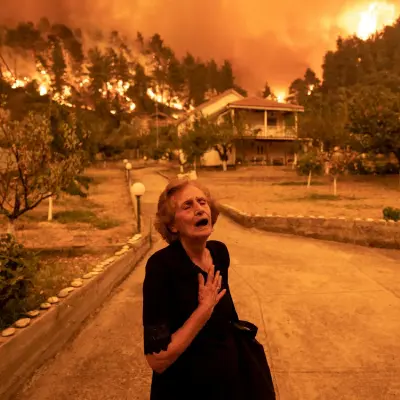
Climate Change for Beginners
23 episodes Last Updated: Mar 25, 24
What is climate change? What can I do to help stop climate change?
In this brand new podcast series scientist and activist Dr. Ciarán O’Carroll explains the science and answers the most frequently asked questions about climate change in a series of bite size podcasts.
This podcast will answer all these questions and more in an accessible and entertaining way and turn you from a beginner into an expert!
Episodes
Mar 25, 2024
Why is Chocolate so Expensive?
Join Dr. Ciarán O’Carroll on 'Climate Change for Beginners' for an eye-opening episode titled 'Why is Chocolate so Expensive?' Explore the intriguing world of chocolate production, uncovering the deep impact of climate change on cocoa prices, shrinkflation, and the livelihoods of West African farmers. Learn about the broader implications of our changing climate on global food supplies, human rights, and what it means for your favorite sweet treats. This fun, accessible podcast breaks down complex issues into beginner-friendly insights, making it the perfect listen for anyone looking to understand the environmental and economic forces shaping our world and our chocolate. Tune in to discover how climate action and sustainable practices can ensure the future of food and indulgence for generations to come.
Oct 24, 2023
Football's Role in Climate Action
Come in
Jul 11, 2023
Who are Just Stop Oil?
The Story of Just Stop Oil - In this episode, we delve into the disruptive tactics of the climate activist group, Just Stop Oil. From blocking petrol stations in Central London to scaling the Queen Elizabeth II Bridge, and even spray-painting the exterior of Harrods, the group's bold actions have led to hundreds of arrests but have also sparked important conversations about the climate crisis. Learn about the group's origins, motivations, and how their guerilla tactics have been perceived by the public, the media, and academic experts studying social movements.
Mar 02, 2022
How quickly can we stop global warming?
*
Mar 19, 2021
What is Net Zero
Five years ago, the United Nations Paris climate agreement set a ceiling for global warming at well below 2 °C, ideally 1.5 °C relative to pre-industrial levels.
To achieve this everyone from the United States, China, the European Union, to the technology firm Microsoft and even an alliance of European airports are saying they will achieve “net-zero” greenhouse gas emissions this century.
But what is Net Zero? And is it the solution to global warming?
While the growth of global emissions has slowed in recent years, there is a large and growing gap between current commitments and what would be needed to avoid exceeding these global temperature limits.
Carbon Brief has provided an analysis of when the world is expected to pass these limits in the absence of large future emissions reductions.
Their analysis shows that:
The world will likely exceed 1.5C between 2030 and 2032 in scenarios where emissions are not rapidly reduced
The 2C threshold will likely be exceeded between 2043 in the highest emissions scenario
In a scenario of modest mitigation – where emissions remain close to current levels – the 2C threshold would be exceeded around 2052.
Oct 24, 2020
Is Climate Change getting better?
On today’s podcast we will answer the question is climate change getting better?
While this year will be memorable for many reasons, it is now more likely than not that 2020 will also be the warmest year for the Earth since reliable records began in the mid-1800s.
The first nine months of the year saw record concentrations of major greenhouse gases – CO2, methane, and nitrous oxide – in the atmosphere - driven by human emissions from fossil fuels, land use and agriculture.
Jun 03, 2020
How bad is flying for the environment?
Around 2.4% of global CO2 emissions come from aviation. Together with other gases and the water vapour trails produced by aircraft, the industry is responsible for around 5% of global warming.
On today’s podcast we will answer the question ‘’How bad is flying for the environment?’
Please subscribe to ‘Climate Change for Beginners’ and you can contact me on Twitter @ClimateCiaran.
May 13, 2020
COVID-19 and Climate Change
On today's podcast we answer the question: "What is the impact of Covid-19 on the environment?"
Follow the podcast on Twitter @ClimateCiaran
Feb 05, 2020
Why is meat bad for the environment?
In 2019 a high-level report commissioned by the United Nations concluded that a huge reduction in meat-eating is ‘essential’ to avoid climate breakdown and keep global heating under 2C.
According to the report the average world citizen needs to eat 75% less beef, 90% less pork and half the number of eggs, while tripling consumption of beans and pulses and quadrupling nuts and seeds.
So why is meat so bad for the environment?